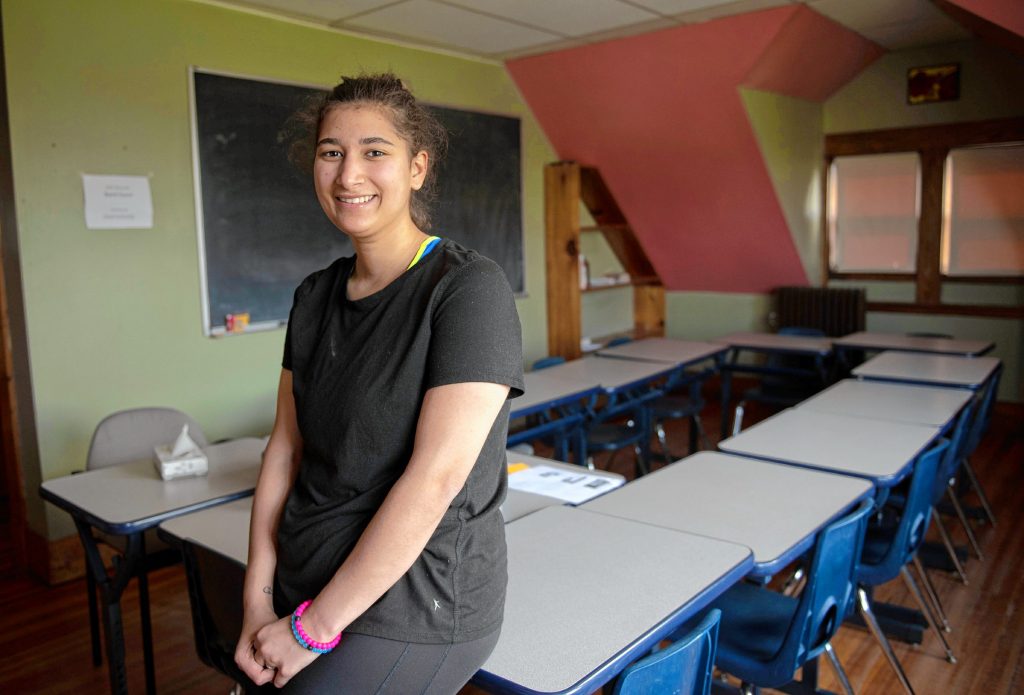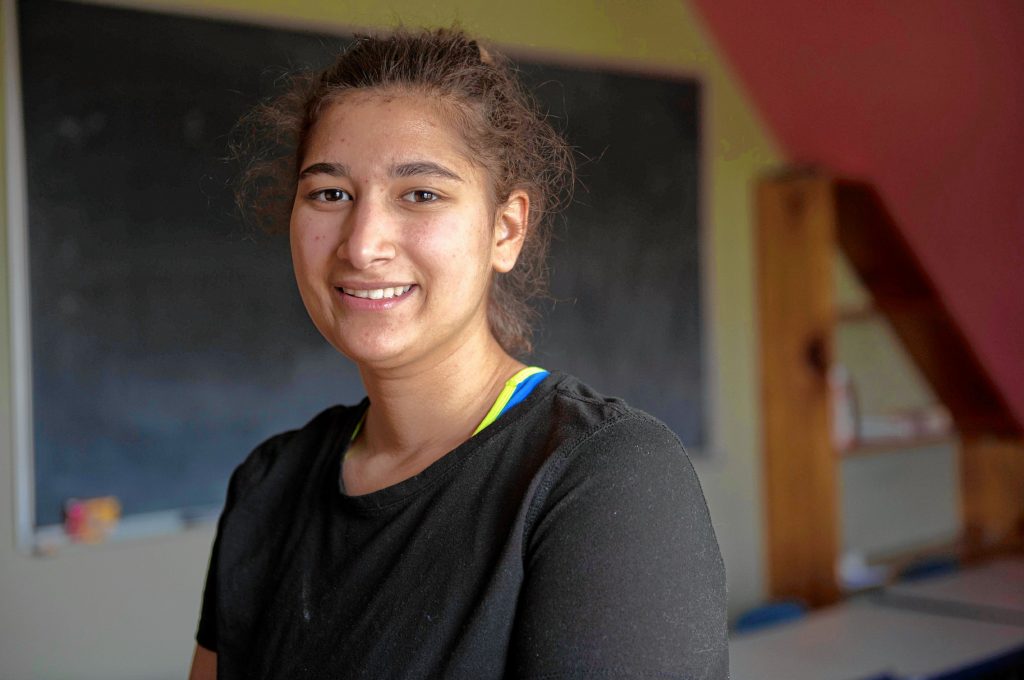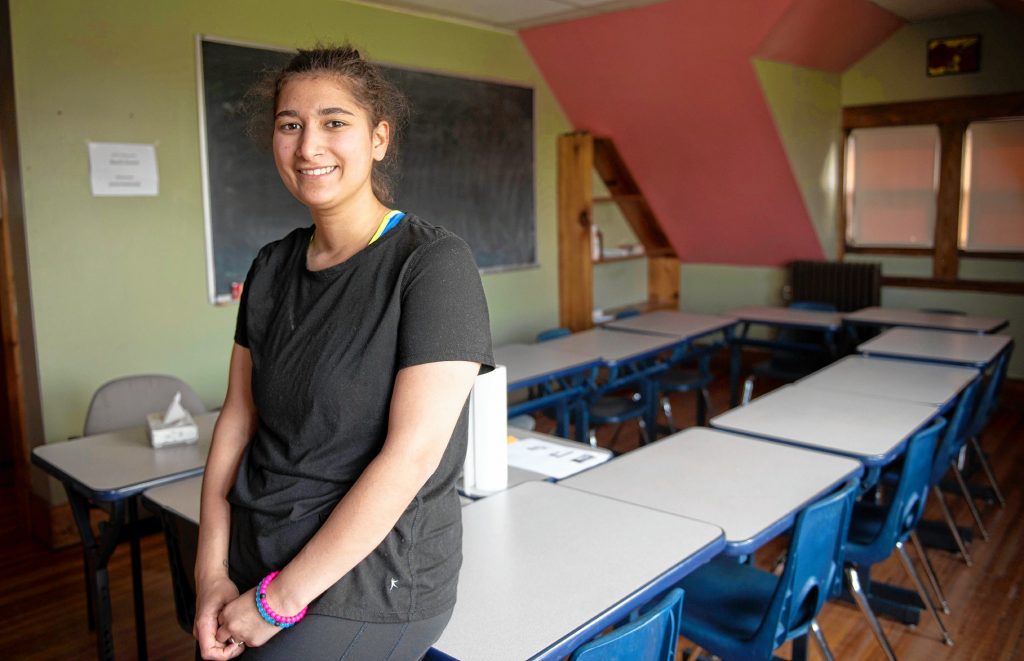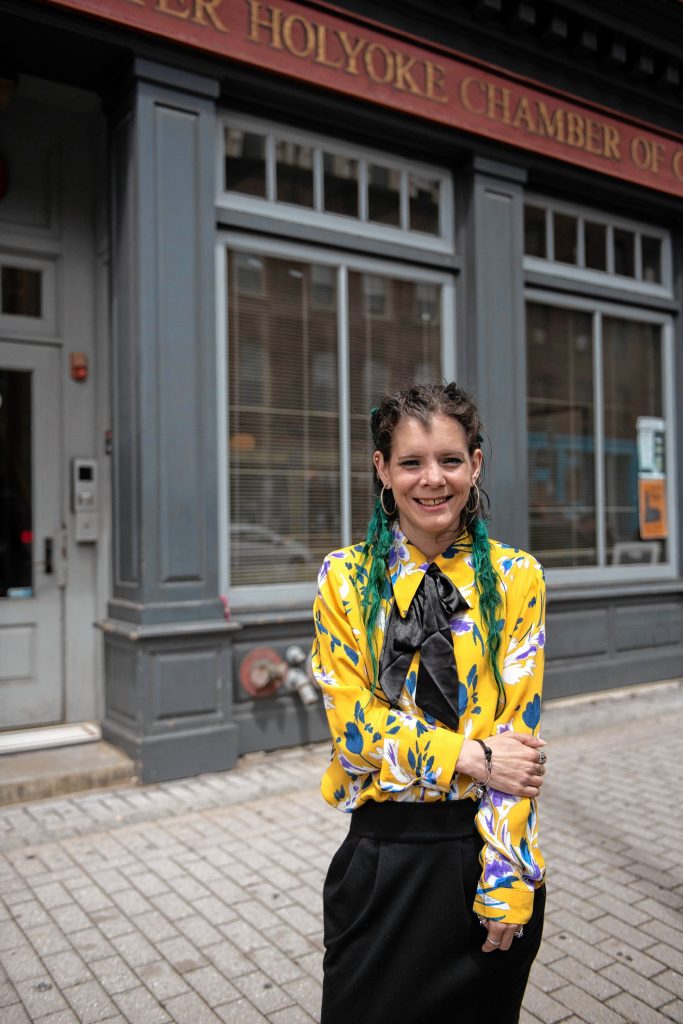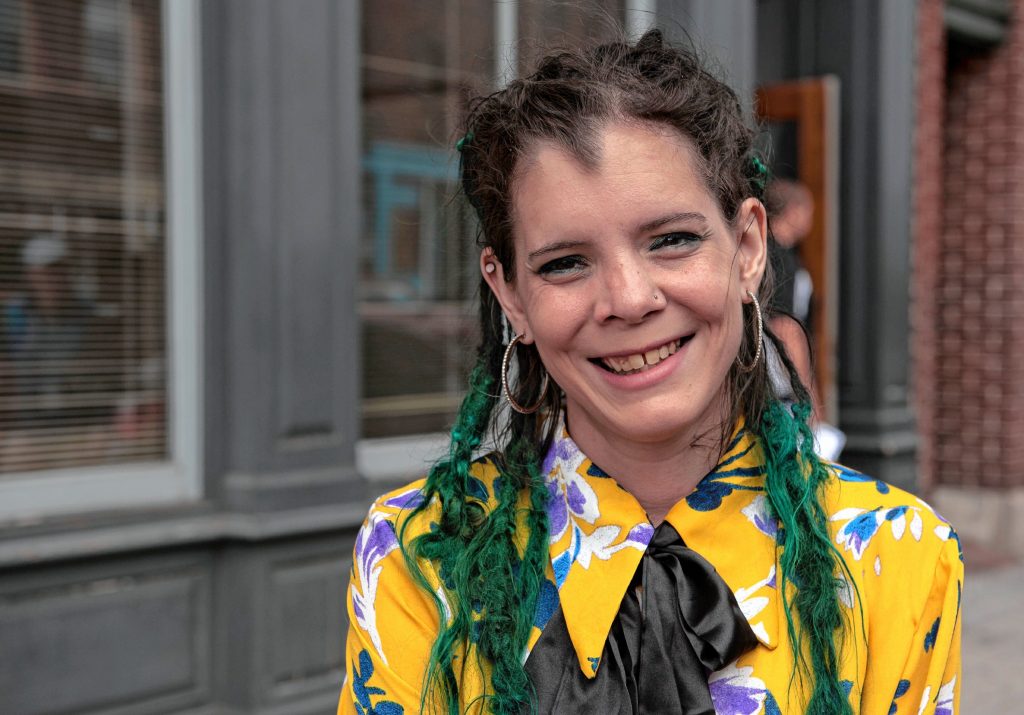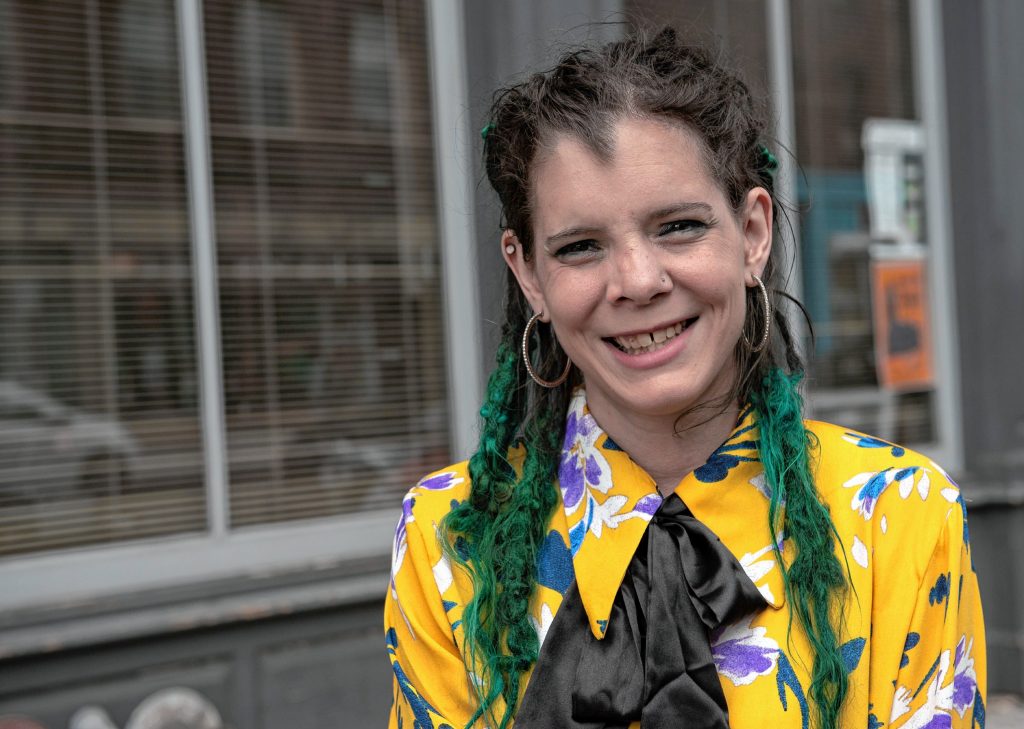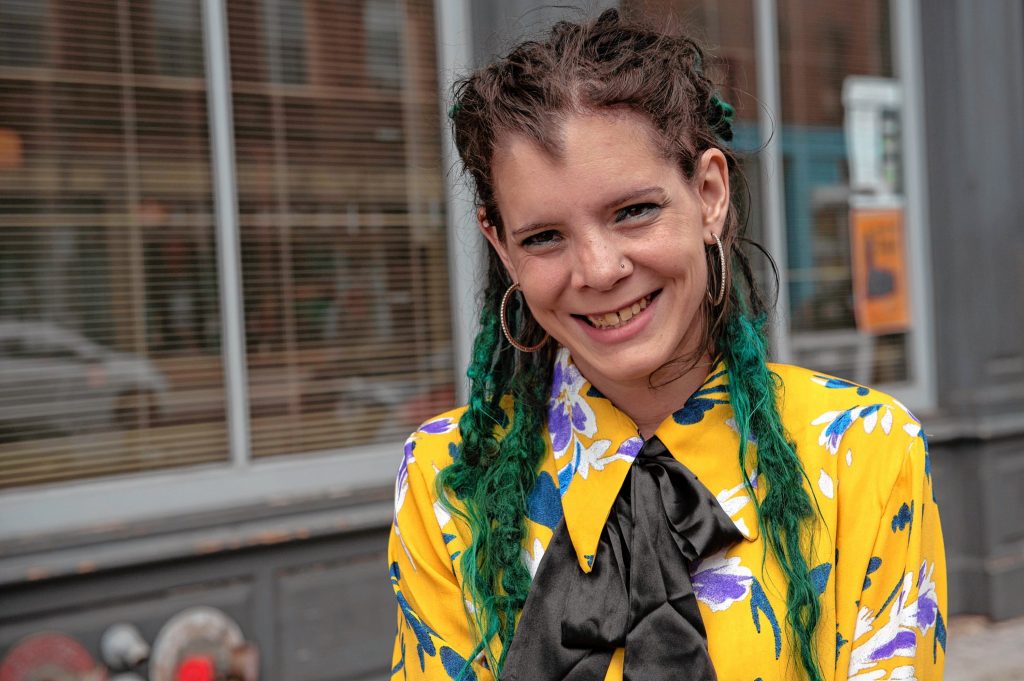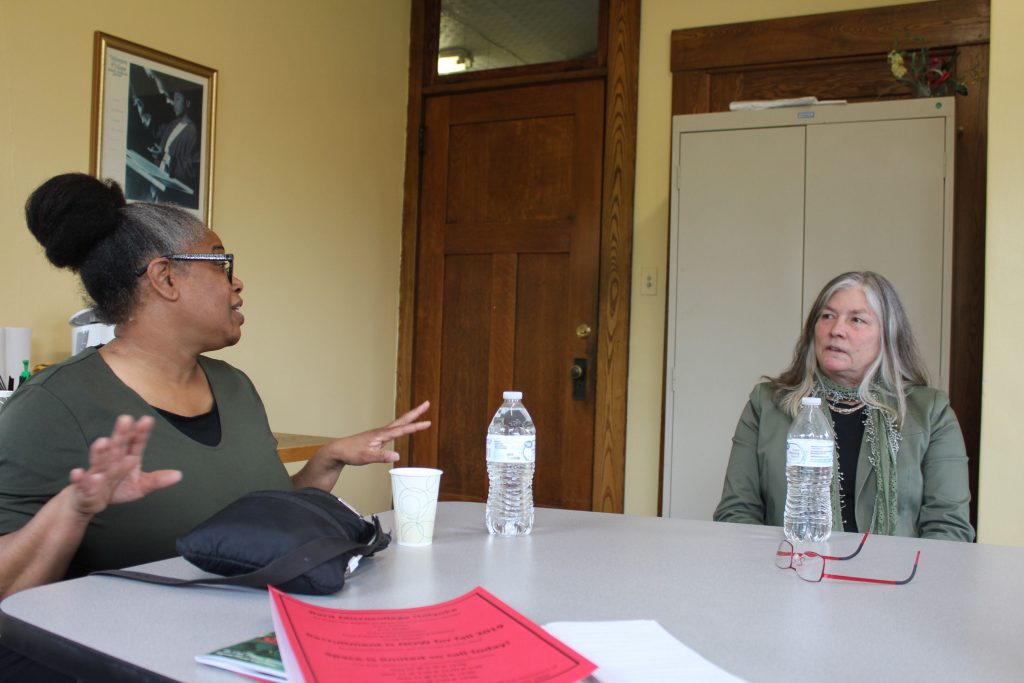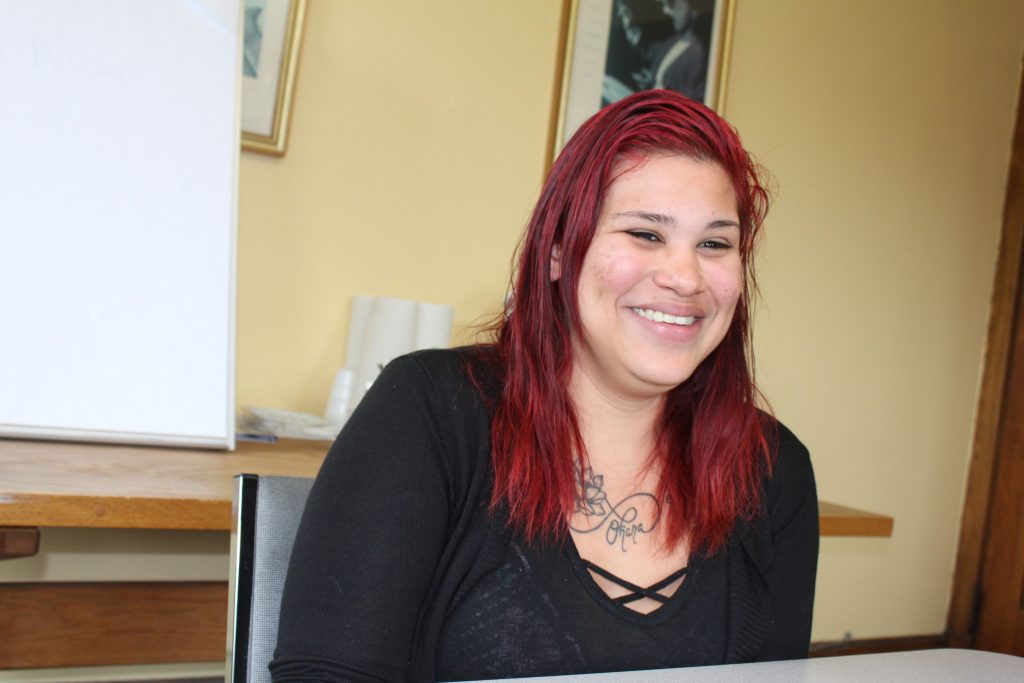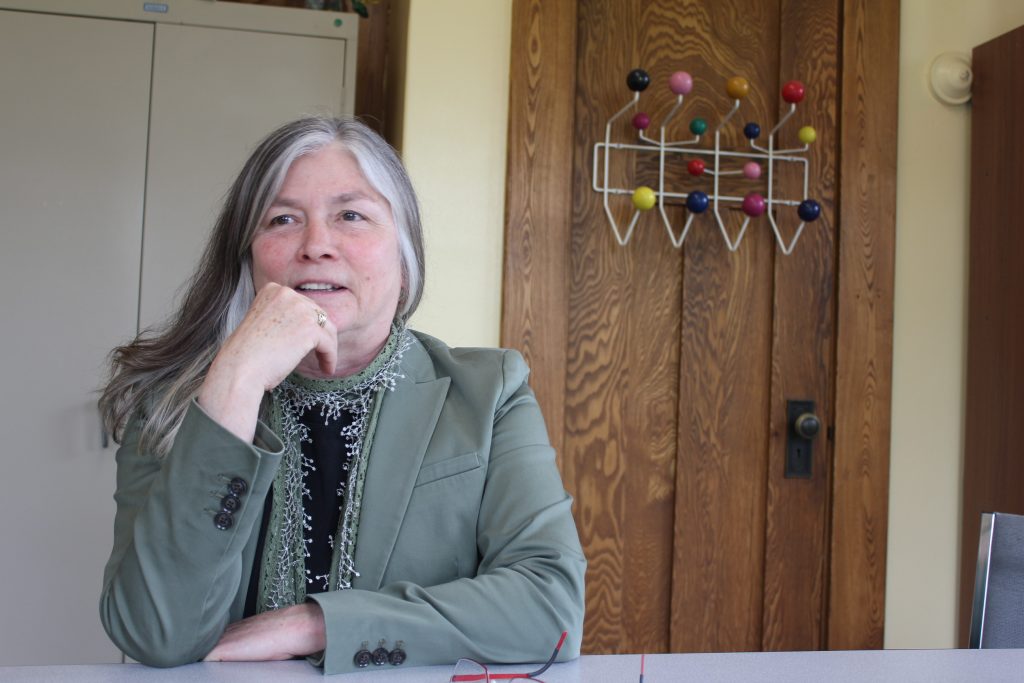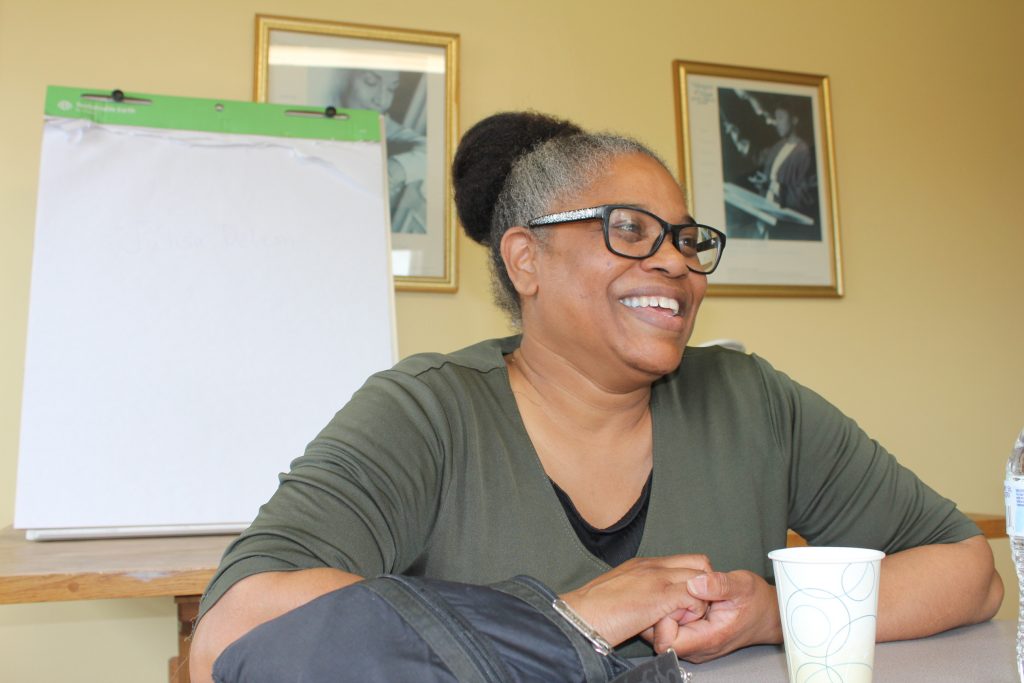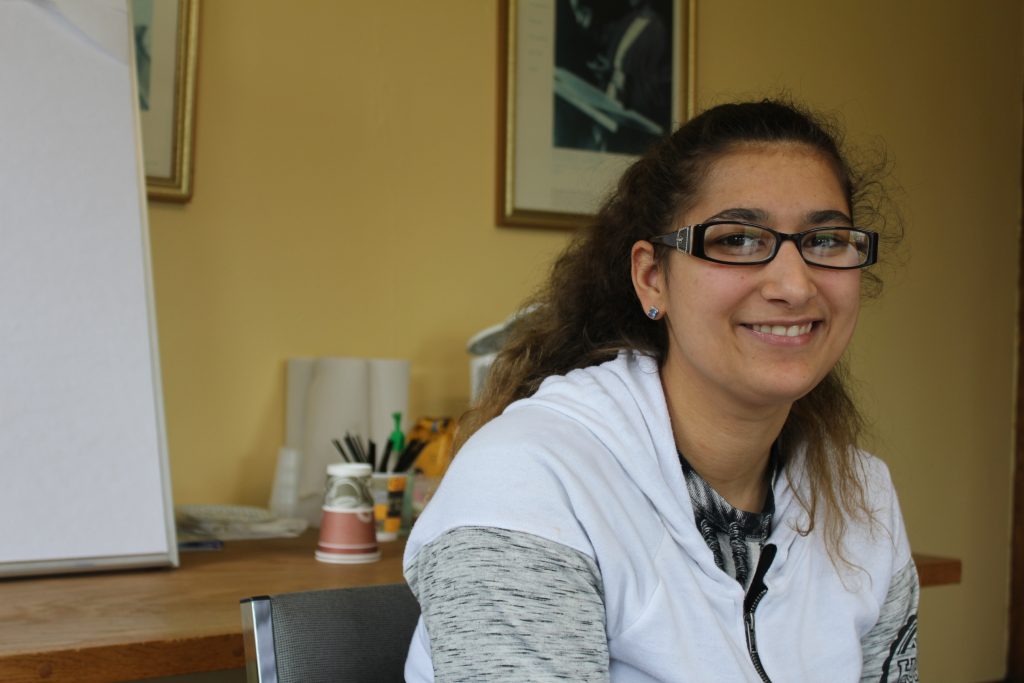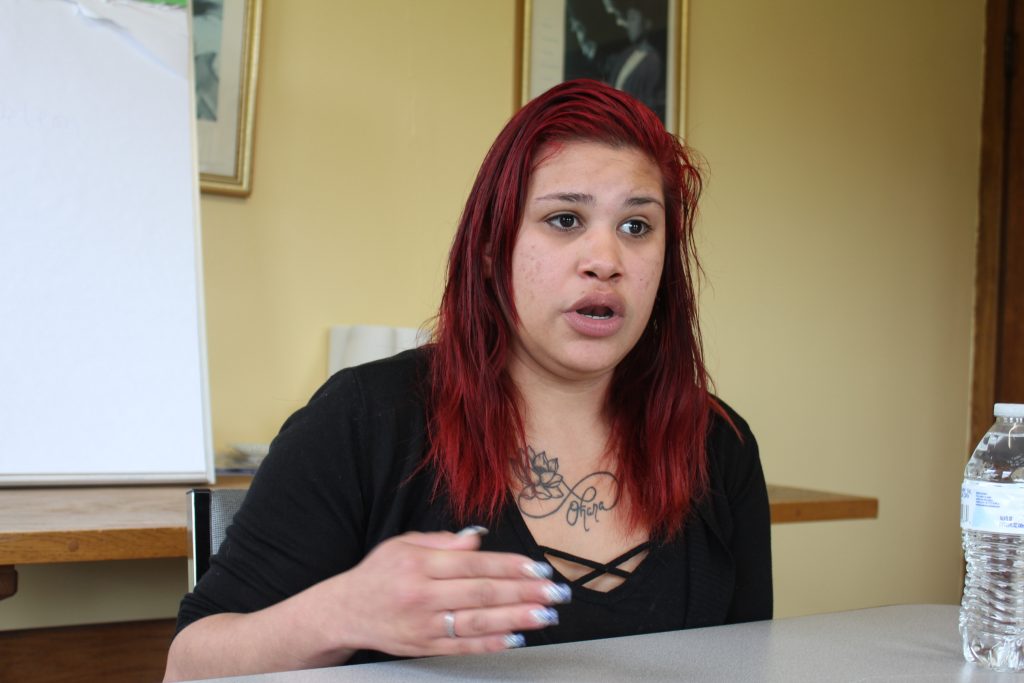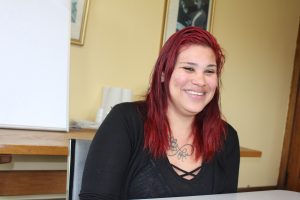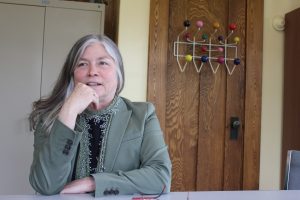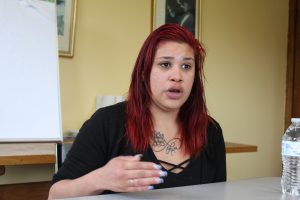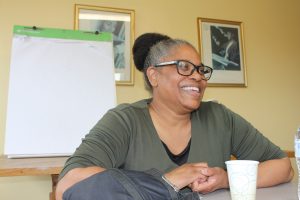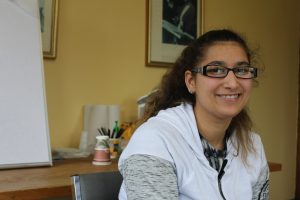Julisa DeLeón, 26, has a love of learning and a long-term goal of becoming a therapist, but she’s faced obstacles. A lifelong Holyoke resident, she graduated Holyoke High School in the spring of 2010 and later that fall began as a 17-year-old freshman at Newbury College, a private college in Brookline.
But DeLeón left Newbury after two semesters due to personal financial constraints: the school had raised tuition. DeLeón transferred to Holyoke Community College to continue her education. During her first semester at Holyoke Community College, DeLeón became pregnant and dropped out.
“School is always an investment and I already had another investment,” DeLeón said, meaning her son who was on the way.
DeLeón found her answer in the waiting room of a health clinic, where a bunch of flyers for the Care Center in Holyoke caught her eye. The center offered college courses, but also offered childcare, transportation to and from the site, and other support services — countering obstacles she was facing continuing at Holyoke Community College.
“It’s never easy to go to school without resources. HCC didn’t have resources,” DeLeón said.
That’s exactly why the Care Center, founded in 1986 to help young women that dropped out of high school to earn their high school equivalency, began offering college programs under the leadership of Executive Director Anne Teschner.
DeLeón is one of a growing number of people coming to the Care Center for college-level course work. Today at the center, all students are low-income and the main student demographic at the Care Center are teen mothers. At the Care Center, students can prepare for high school equivalency and take college-level courses at one of the Care Center’s two programs that offer college credit.
“There are increased negative messages about teen parents and people in poverty. I think there’s a strange association with that, [as] if people in poverty don’t have intellectual hunger. That’s just crazy,” Teschner said.
Getting to college — and finishing
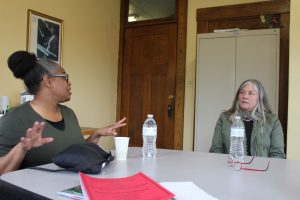
Care Center Executive Director Anne Teschner, right, speaks with Bard Microcollege graduate Tina Scott. Maureen O’Reilly photo.
Unlike most high school equivalency programs that focus on test prep, the Care Center models after a prep school, with components like arts, humanities, physical activity, small class sizes, and, importantly, a basic expectation of success, Teschner said.
“We expect that students will go to college,” she said.
But Teschner came to realize that the goal needed to be more than about going to college, but completing it, as well. The Care Center wrestled with the extent of its educational responsibility.
The picture was clear: since 2004, an average of 75 percent of the Care Center’s high school equivalency program graduates went to college, compared to a national average of 2 percent of graduates from other high school equivalency programs, Teschner said. However, of those Care Center graduates who went on to college, only 15 percent were graduating.
In the 21st century, getting a high school equivalency did not have the same effect raising people out of poverty like it did in the past, Teschner said, which raised questions if the Care Center was adequately providing its students with adequate tools for achievement.
At first, the Care Center leadership team focused on success happening within its doors, but then came to the realization that it was necessary to offer college programs of their own.
“Our stance was, well we don’t run a college, why would you hold us accountable for what happens in another institution? It didn’t seem to be our problem,” Teschner said, “It took us a while to own the statistic.”
As part of a commitment to educating, the Care Center removes roadblocks to education by offering resources to students, like transportation to and from the center, daycare, food, and on-site counseling and medical assistance.
“We clear the deck for you,” Teschner said, noting that the women can focus on themselves as students after other needs are met.
Teschner joined the Care Center in 1998. At that time, the Care Center taught high school equivalency courses, had a licensed day care center, and provided outreach in Holyoke public schools with a teen pregnancy prevention program that morphed into youth development.
Now, the Care Center makes collegiate-level material accessible.
‘We do what we gotta do’
DeLeón decided to apply for the Care Center’s Clemente Course in the Humanities — an accredited program through Bard College that teaches students an introduction to the humanities, modeled after a liberal arts school. This year marks the 20th anniversary of the Clemente Course at the Care Center.
During the month-long wait to learn whether she was accepted, there was no doubt in DeLeón’s mind that she was going to get in.
“I was excited. I was sure. I was pretty cocky about it,” DeLeón said with a laugh. She told her friends and family that she was getting in. She started the Clemente Course in the fall of 2014, the week after her son Gabriel was born.
“I was pumping milk on my breaks,” DeLeón said, adding that this is not an uncommon experience of other mothers in the program. “We do what we gotta do.”
The Clemente Course in the Humanities is a six-credit introduction to the humanities. Students read Plato, take a course in art history, and leave the program as better writers. Each year, about 25 women take the course at the Care Center, out of about 50-plus applicants. The Clemente Course is offered nationwide, and in Massachusetts, the Clemente Course is also offered in Springfield, Worcester, Dorchester, and New Bedford.
The base of the course is the same one used at universities like Columbia and Harvard, meaning that students are getting the basics of humanities in Western thought, Teschner said.
Upon completion of the Clemente Course, students receive a certificate and an official transcript from Bard College.
Since 2016, the Care Center has offered another route to receiving college credit, this time in a degree-awarding program.
In the fall of 2016, the Care Center launched Bard MicrcoCollege Holyoke, an associate’s degree program that operates within the community organization. It’s the first of its kind in the country.
Bard Microcollege Holyoke was based off of another Bard College program, the Bard Prison Initiative, which brings associate degree programs to six New York state prisons, said Dr. Mary Anne Myers, the director of Bard Microcollege Holyoke, who moved to Holyoke in 2016 for its launch. Myers previously taught with the Bard Prison Initiative.
Three cohorts of students have started the Bard Microcollege Holyoke program. The first cohort had a 100 percent graduation rate, spread out over three years, Myers wrote in an email. Students who start Bard Microcollege Holyoke with credits from the Clemente Course or other colleges could finish in two and a half years or less, Myers wrote, whereas a student with no transfer credit could finish in three years.
The harder sell was to students who came from families where going to college wasn’t the norm, Teschner said.
“We needed to make ‘Hey, let’s go to college’ not sound like ‘Hey, let’s go to Mars,’” she said.
A step up
After completing the Clemente Course, DeLeón applied to Bard Microcollege Holyoke.
“Clemente prepared me for Bard,” DeLeón said, “It’s a good step up.”
DeLeón bristled at the notion that new mothers can’t do anything besides take care of their babies. In her experience, the resources that the Care Center provided allowed her and other mothers to continue to study.
For DeLeón, Bard Microcollege Holyoke was a step towards finishing her education and fulfilling her goal of becoming a therapist.
“I already knew I wanted to go to college. I would be capable of going and doing good,” DeLeón said.
DeLeón started Bard Microcollege Holyoke with an infant: Her second child, Jacob, now 2, was born just before she started classes.
In her experience, DeLeón thinks that being a mother and being a student go hand-in-hand.
“There’s more room for mothers when you’re a student. If I’m reading poems, if I’m reading a required [book], I will read aloud to my son,” DeLeón said, adding that her son Gabriel, who is now 6, has an incredible vocabulary.
DeLeón graduates from Bard Microcollege Holyoke this spring and will start this fall at Mount Holyoke College, in the Frances Perkins program for non-traditional students, where she plans to major in psychology.
DeLeón’s vision is to open a homeless shelter that provides wrap-around services to help people re-stabilize to become functional people in society. It’s a vision that furthers her professional goals — she can be the therapist — and touches a personal history. DeLeón said that she and her family have dealt with homelessness, an experience she didn’t want to speak about in depth, but one she said inspired her to help others.
“I’m compassionate for people who have fallen hard in life, so I guess that’s my contribution back,” she said.
‘It just opens all these doors’
As a pre-teen, Candice Pelletier, 28, dreamed of going to college and having a career. As a senior in high school in Houston, Pelletier applied to numerous scholarships but college remained too expensive and out of reach. She dropped out her second semester of her senior year.
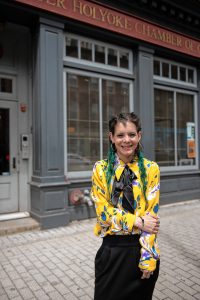
Candice Pelletier, a recent graduate from the Bard Microcollege Holyoke, in front of the Holyoke Chamber of Commerce where she is now employed. Carol Lollis photo
“I spent the majority of my school years preparing for college. And it felt like ‘What’s the point?’ if I couldn’t even go,” Pelletier said about her decision to drop out. She worked in fast food restaurants for a number of years to pay the bills.
“I was pretty disappointed in myself,” Pelletier said of that time period, as she watched her peers graduate from college. “I was happy for those around me, but I was jealous.”
Pelletier moved to Holyoke from Houston six years ago to be with her sister and her mother. It was her mother who told her about the Care Center.
Applying for the Care Center brought Pelletier an opportunity to go to college. But it also brought anxiety.
“It was really terrifying — could I go back to this again? Would I be smart enough?” Pelletier said. In spite of her self-doubt, Pelletier said that it was really fulfilling to have the opportunity to go back to school.
“I like being challenged intellectually. I had dropped that part of my life off for so long,” Pelletier said, “I felt almost whole again… reading Plato for the first time, learning about philosophy — stuff I didn’t have any inkling of — it was just amazing.”
Pelletier graduated from the Clemente Course in 2014 and was in the first Bard Microcollege Holyoke cohort in the fall of 2016.
“It was just amazing to be told you have all of these options. You don’t have to worry about money for books or transportation. You just have to worry about getting yourself out of bed and [going] to class,” Pelletier said. “It just opened all of these doors and keeps opening these doors.”
Her experience with the Care Center has helped Pelletier to regain confidence and reconnect with the student she was years ago.
“I’m still smart and still capable of doing these things. It doesn’t matter that it’s a little bit later than other people,” Pelletier said.
This spring, Pelletier finished her first year at Smith College in Northampton, where with her credits she entered as a second semester sophomore. She said her experience at the Care Center has prepared her for Smith.
Pelletier wants to become a political journalist, an interest she’s held onto since she was 12 years old. Pelletier likes to go to Smith’s writing center to improve her work, but has found it’s hard to get an appointment.
“I cheat the system. I go back to Bard to ask for help,” Pelletier said with a laugh.
To those at the Care Center that will seek a bachelor’s degree, Pelletier has a bit of advice: “Schedule your time wisely and stick to your schedule because things happen,” Pelletier said. “You need to stay organized and make sure you keep track of everything.”
Waiting for that ‘A-ha!’ moment
Kristina “Tina” Scott, 54 of Springfield, graduated high school in 1982 and worked for years. In 2014, she went to Springfield Technical Community College to update her clerical skills. After she finished, Scott received a text message from a friend, telling her about the Clemente Course. Scott was intrigued; she always liked writing and was interested in philosophy.
She started the Clemente Course in October 2015 and was challenged by the high expectations. The sheer volume of reading and tackling philosophy were difficult, she said.
“We read all the classics… Aristotle, Plato, Kant, Mills. I was emailing my professor all the time,” Scott said. The professor was great, and saw that Scott was really trying to understand the material, Scott said.
She graduated from the Clemente Course in 2016, and, during a visit back to the Care Center, a writing professor told her about Bard Microcollege Holyoke.
The timing wasn’t exactly right, Scott said; she was getting back on her feet financially and was the breadwinner for herself and her great nephew, who lives with her. A year later, Scott quit her job and applied for the Bard Microcollege cohort that began in the fall.
Her acceptance to the program made her feel motivated, Scott said.
“I was really happy. I was really excited. I knew it was going to be a challenge,” Scott said. “But I was up for the challenge.”
As a student, Scott worked part-time at Con-Test Analytical Laboratories, in East Longmeadow. She has had to arrange her schedule to have time to study and walks to the library after her Saturday morning shift.
Scott graduates from Bard Microcollege Holyoke this spring and will begin this fall at Mount Holyoke in the Frances Perkins program, which accepts up to 25 non-traditional students each year.
The timing couldn’t have been better, she said; her great nephew graduates high school this spring and will attend Word of Life Bible Institute in New York in the fall.
Throughout her studies, Scott learned a different side of poetry than what she learned in high school.
“I really like learning about Emily Dickinson. I didn’t know she wrote so many poems. I didn’t know she was from this area,” Scott said.
Scott’s interest in Emily Dickinson will inform her collegiate area of study.
“My major will be in English with a concentration in poetry,” Scott said, adding that she’s not married to the idea. Other Bard Microcollege Holyoke graduates have reported that classes have awakened an interest and changed their plans. Scott is prepared for that experience.
“I’m waiting for that ‘A-ha!’ moment. I know [my interest] will be revealed or confirmed when I get there,” Scott said.
For now, she’s not looking too far into the future.
“I’m reveling in the moment. I’m waiting to experience everything Mount Holyoke has to offer,” Scott said.
Teen mom tackles goals
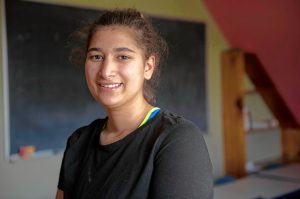
Alissia Julia Rose in a classroom at the Care Center where she will be attending classes this fall. Carol Lollis photo
Alissia “AJ” Rose, 19, sees education as a way to create a better life for her daughter. Rose is originally from Falmouth, where she lived with her dad and attended high school. Rose said she struggled with depression and failed all of her high school classes because she would listen to music and draw instead of doing coursework.
Reflecting on her mindset at that time, she said it would have been difficult for anyone to motivate her to do well in school.
But in 2018, Rose’s daughter Catalina was born, and that ignited a new motivation for her.
“I know I wanted to get my GED. I wanted to be economically stable to provide for her,” Rose said, adding that she did not want to be on welfare, which was a part of her own childhood.
After her daughter was born, Rose moved to Holyoke, where her mother’s family lives. Her grandfather’s friend told him about the Care Center, and Rose’s grandfather passed the information along to his granddaughter.
Rose completed her high school equivalency at the Care Center. Now, she is enrolled in the Clemente Course.
Through the Care Center’s rowing team, which practices at Mount Holyoke’s gym, Rose has reconnected to a positive part of her high school experience, playing soccer and volleyball in Falmouth.
“That was a huge moment for me,” Rose said of her participation on the rowing team. She said it boosted her confidence and reconnected her to water, something she misses now that she lives far away from a beach. “I just felt like a mermaid again. I’m just obsessed with water.”
She has taken prerequisite classes at Holyoke Community College so she can become a certified nursing assistant. Her ultimate goal is to become an emergency room nurse.
“I’m just happy where I turned out,” Rose said.

